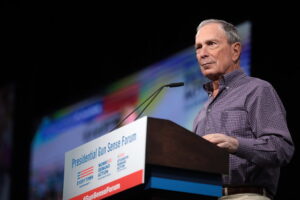by The Cowl Editor on February 27, 2020
National and Global News

by Addison Wakelin ’22
News Staff
On Wednesday, February 19, at the Paris Theater in Las Vegas, NV, six Democratic candidates lined up to debate in the ninth installment of the 2020 Democratic Party presidential debates.
This debate has been the most-watched Democratic presidential primary debate in its history, with a record 19.7 million viewers tuning in, as the 2020 presidential election draws closer.
With future state primaries and caucuses coming up, each debate has been significantly more confrontational as each of the Democratic candidates hopes to receive the party nomination. Sanders has already proved a promising early lead as the potential presidential nominee for the Democratic Party. He has shown a strong polling performance in the Iowa caucus, won the New Hampshire primary, and is projected to win the Nevada caucuses.
As Super Tuesday is less than two weeks away, the next few debate cycles are even more important as candidates try to make last-minute impressions to appeal to voters.
The qualified candidates, who had to meet the polling thresholds at both state and national levels to be eligible for this debate, included: U.S. Senator Bernie Sanders, former Mayor of South Bend Pete Buttigieg, U.S. Senator Amy Klobuchar, former Vice President Joseph Biden, U.S. Senator Elizabeth Warren, and former Mayor of New York City and billionaire Michael Bloomberg.
All took to the stage to debate the usual highly contested, yet important, topics pertaining to the Democratic Party. Such topics included health care, general individual electability, economic inequality, and climate change.
However, most of the candidates’ focus was on the presence of Michael Bloomberg, who made his first major debate appearance that night. The former New York City mayor has had a somewhat contentious political legacy, particularly in the controversial policies he had passed during his mayoralty. Several of the other candidates extensively criticized his policy history; one of Bloomberg’s most notorious actions was his support for and implementation of Stop, Question, and Frisk (SQF) that many of his critics have condemned as racist and shameful, as it purportedly targeted specific minorities in high-crime areas in New York City.
The debate opened up with NBC News anchor and moderator of that evening’s debate, Lester Holt, immediately posing a question to Sanders about Bloomberg’s hopes to beat Trump in November. Sanders stated, “Mr. Bloomberg had policies in New York City of stop and frisk which went after African-American and Latino people in an outrageous way.” Sanders has long criticized the conglomeration of wealth that much of the one percent, including Bloomberg himself, hold in the United States.
The most noteworthy critic of Bloomberg on Wednesday, however, was Warren. Shortly after Sanders criticized Bloomberg’s past, Warren, a former bankruptcy lawyer with a history of criticizing billionaires and their oppositions to a wealth tax, condemned Bloomberg’s past. Particularly she criticized his own wealth and how he has been able to avoid contentions for so long because of it.
In response to Bloomberg’s comments on his hopes to defeat President Trump in November, Warren went in for a direct attack on Bloomberg’s refusal to release NDAs along with his inability to release his tax returns, a major blow to Bloomberg’s opening night to impress the U.S. as a hopeful presidential nominee.
Warren stated, “So I’d like to talk about who we’re running against, a billionaire who calls women ‘fat broads’ and ‘horse-faced lesbians.’ And, no, I’m not talking about Donald Trump. I’m talking about Mayor Bloomberg. Democrats are not going to win if we have a nominee who has a history of hiding his tax returns, of harassing women, and of supporting racist policies like redlining and stop and frisk.”
The ninth installment of the Democratic debates did much more than simply reflect the current political state of the Democratic Party. The debates also represent the importance of what separates the Democratic Party from its opposition, and the partisan views represented by the two.
As the 2020 presidential election draws closer, the candidates continue competing to win Democratic primaries and caucuses in the hopes of obtaining a spot as the party nominee in order to try and defeat Trump in November.